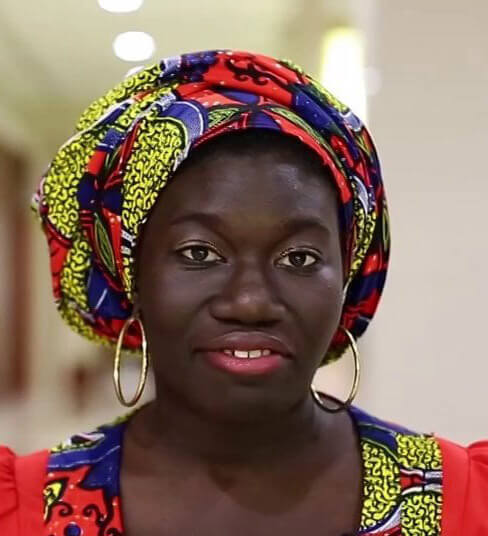October 4 - 6, 2018
School of Global and International Studies
Indiana University, Bloomington

October 4 at 6:00 pm
Shreve Auditorium, Global and International Studies Building
Reception immediately following
Dr. Tall, Senior Climate Specialist at the World Bank, is one of the world experts on global climate services, adaptation, resilience building and community-based early warning systems, operating at the nexus of climate knowledge and societal benefits. She started her career with the Red Cross International Federation where she served as regional technical adviser for West and Central Africa for several years, before joining the CGIAR Research Program on Climate Change, Agriculture and Food Security (CCAFS). A passionate researcher, practitioner and user of climate services herself, Arame's previous post was in her home country of Senegal where she coordinated the work of the World Meteorological Organization (WMO)'s Global Framework for Climate Services (GFCS) Regional office for Africa.
Arame currently is a Senior Climate specialist at the World Bank, leading on adaptation and resilience work within the WB Climate Change Group
Title: Saving the Adaptation Fund: On Political Capital and future implications for Financing Development, climate adaptation, and Loss & damages
Presenter: Anna McGinn and Cindy Isenhour
Description: Paying particular attention to the political capital that proponents expended to preserve the Adaptation Fund under the Paris Agreement, we explore how this investment might affect the future of financing for developing countries—for climate adaptation, loss and damages and development—as well as how this unwavering support impacts Fund accountability and on-the-ground project implementation.
Title: Through the Lens of Carbon: Climate Change and Agricultural Development in Costa Rica
Presenter: Dana Graef
Description: Throughout the world, sustainable development initiatives have increasingly emphasized the importance of climate change adaptation and mitigation. One dimension of this is attention to the importance of carbon. Drawing from long-term anthropological research in Costa Rica, this paper examines how climate change is changing the place of sustainable agriculture in Costa Rican environmental ideologies.
Title: Climate Change and Mobility in Haiti: Security and the Other in a Warming World
Presenter: David Meinen
Description: While the relationship between climate change and anticipated migration patterns remains little understood, as the debate becomes further solidified in expressions of insecurity, the more the climate refugee is cast as a threat to international stability. I will lay out a preliminary guide to studying the climate migration phenomenon in which I aim to establish a conceptual and methodological framework to make sense of emergent mobilities in the Canada-Haiti context.
Title: How Can We Pay For it All? Understanding the Challenge of Financing Climate Change and Sustainable Development Solutions
Presenter: Jacob Park
Description: Despite greater attention to climate change and sustainable development initiatives by national governments, civil society groups, and private companies, the international community is confronted with a question which has existed since the 1992 Earth Summit: how can we pay for it all? To unpack this question, I argue in this paper that there needs to be greater clarity around the issue of climate change investment, finance, and funding (CCIFF) that is frequently absent or inadequately addressed in the academic and policy literature.
Title: Collaborative Survival and the Politics of Livability in Transitionary Times
Presenter: Jamie Haverkamp
Description: This paper seeks to push beyond collaboration as an assumed good and contributes to deeper theorization and conceptualization of the arts of collaboration and alliance politics, specifically within the context of environmental change and global sustainability.
Title: Is EU New Hegemon of International Politics? Game Theory Analysis on EU Civil Aviation ETS (Emission Trading System)
Presenter: Jiangtian Xu
Description: The paper will use the EU’s Civil Aviation Emission Trading System as the case to analyze the battle of EU on international regime making within the game theory context.
Title: The Greening Effect of Governance Aid: Foreign Aid, Political Institutions, and Environmental Performance in Less Developed Countries
Presenter: Jonas Gamso
Description: Conceptualizing environmental protection as a public good that will be more effectively provided where representative political institutions are in place, and drawing on recent findings demonstrating that aid targeting governance-oriented projects fosters better political institutions, I argue that governance aid should lead to improvements in terms of environmental policy and practice in recipient countries.
Title: Consulting culture for climate change responses: case of climate ritual adaptations in Africa
Presenter: Mokua Ombati
Description: This study, framed on the prism of extant data on weather and climate manipulation rituals, more prominently referred to as ‘rainmaking rituals’, explores an understanding of how cultures across Africa have, over the centuries, characteristically utilized this form of cultural knowledge to respond and adapt to climate change.
Title: A Missed Opportunity for Transformation? – An Analysis of Official Climate Change Discourse and Adaptation Strategy in Nepal
Presenter: Pearly Wong
Description: The majority agrarian society and fragile mountain ecosystems in the Himalaya contribute to the framing of Nepal as a 'highly vulnerable' country that requires international support to cope with climate change. This paper begins by exploring the different climate justice discourses as well as critical approaches to climate change adaptation, followed by a case study of Nepal to examine their translation into its national and sub-national policy framework.
Title: Acceptable Tradeoffs Between Economic Growth and Environmental Protection
Presenter: Youngchae Lee
Description: This study’s findings suggest that in order to increase awareness and support for the addressing of environmental problems caused by rapid economic growth in developing countries, helping individuals internalize the costs of environmental damage originating in a remote area through information and training seems essential.
Title: Hybridizing the Local and the Scientific as Mechanism for Climate Change Adaptation Strategies
Presenter: Oluwole Coker
Description: This paper draws on insights from an ongoing study aimed at integrating local and scientific knowledge in evolving climate change adaptation strategies. It aims to explore how local knowledge can be harnessed and integrated into existing scientific knowledge as it relates to climate change /variability and its impacts at the local level.
HAMILTON LUGAR SCHOOLBLOOMINGTON
355 North Eagleson Avenue